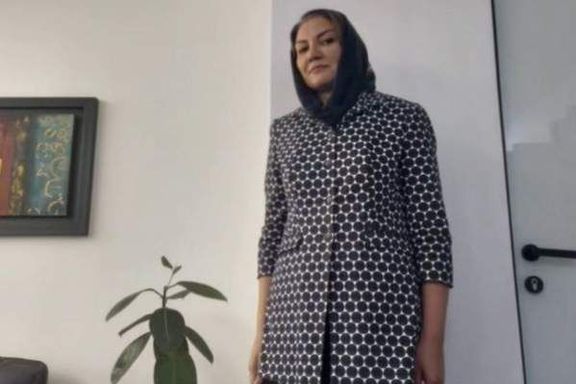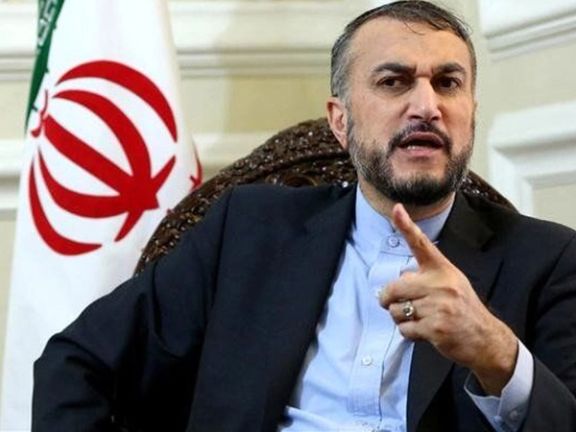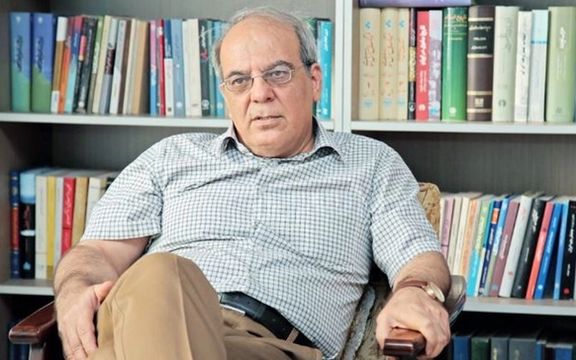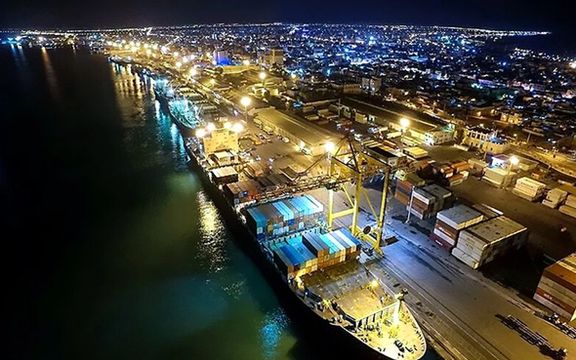Iran Bars Pharmaceutical CEO From Meeting For 'Violating' Hijab

Iran's ministry of health denied entry to Haleh Hamedifard, the CEO of a prominent pharmaceutical company, due to non-compliance with Islamic dress code.

Iran's ministry of health denied entry to Haleh Hamedifard, the CEO of a prominent pharmaceutical company, due to non-compliance with Islamic dress code.
Due to attend a meeting at the ministry, the CEO of CinnaGen Company and a well-known figure in Iran's pharmaceutical industry, was refused entry based on the length of her manteau, a traditional Iranian outer garment worn by women.
In a social media post accompanied by a photo of herself wearing the manteau, Hamedifard wrote, "I was just denied entry to the ministry right now because my manteau is short. It's truly unreasonable."
Hamedifard went on to voice her anger at the way she was treated, given her position as the representative of the primary producer of medications for special cases and hard-to-treat patients. She pointed out the dire circumstances faced by patients and their families waiting for imported medicines due to shortages right outside the ministry's premises.
She thanked her male colleagues who had chosen not to attend the meeting in solidarity with her. "I love this country; it's my home, and I won't go anywhere else," she affirmed.
Hamedifard had previously won the Book of the Year award in the Islamic Republic in 1999.
The incident follows a recent case involving Fatemeh Rajai-Rad, a physician in the northern city of Amol. She was summoned to court for attending a formal event without compulsory headscarf amidst the regime's tightening of hijab laws.

Approximately 150 Iranian MPs have volunteered to serve in the Iran-backed Hamas' war on Israel which broke out on October 7.
MP Ahmad Hossein Fallahi said Wednesday that many of the current parliament members are veterans of the Iran-Iraq War, a war which ended in 1988. This would make the average age of these men at least 50.
He claimed the commanders, who have front line experience in the likes of Syria and have served in the Islamic Revolutionary Guard Corps, are willing to go to Gaza's front lines against Israel.
Those unwilling to pick up arms have also “voluntarily chosen to have deductions from their November salaries to provide financial assistance”, he said. The contributions have ranged from 50 to one billion rials, which is roughly equivalent to $100 to $2000.
Fallahi emphasized that there is no immediate need for direct military deployment by Iran, as there are already permanent Iranian military personnel in the region who are “countering aggressors”, referring to its proxies in Lebanon, Yemen and Syria which have been attacking Israel from its other borders. Meanwhile, a team of Iranian reporters has joined the Iranian Red Crescent which claims to be taking aid for Gaza via Egypt.
Meanwhile, Mahmoud Abbaszadeh Meshkini, a member of the National Security Commission of the Parliament, repeated regime warnings which have been issued since the beginning of the war, saying that if Israel continues its ground operation in the Hamas controlled strip, "the Islamic Republic may strike them in a way they had never imagined."
The Iranian regime's recent campaign to recruit fighters for the Hamas war against Israel has faced skepticism and ridicule on social media. Many Iranians view the campaign as a propaganda effort. Additionally, logistical challenges, especially for individuals with Iranian passports, make it improbable for civilians to participate in the conflict, even if the Iranian regime were to engage in it.

Iran's Foreign Minister Hossein Amir-Abdollahian issued another threat on Wednesday, warning that there could be "harsh consequences" if attacks on the Gaza Strip continue.
Iran has been vocal about its support for its proxy Hamas in the Gaza Strip, which declared war on Israel on October 7 when it murdered 1,400 mostly civilians and took 239, also mostly civilians, hostage. The foreign minister has said clearly that the regime has its hand on the trigger should Israel's subsequent bombardment cease.
"If an immediate ceasefire doesn't take place in the Gaza Strip and the rapid attacks by the US and Zionist Regime continue then the consequences would be harsh," he said in Ankara during a news conference in Ankara with his Turkish counterpart.
He also claimed an upcoming visit to Turkey by Iran's President Ebrahim Raisi is on the agenda. Both Iran and Turkey called for a regional conference to address what they claimed aimed to prevent the escalation of the Israel-Hamas conflict, in spite of both agitating for its escalation. Turkey's Foreign Minister Hakan Fidan emphasized the need for an immediate ceasefire to avoid further violence in the region and expressed concerns about the humanitarian impact of the conflict.
Iranian proxies have attacked US facilities in the region and its proxies in Yemen, Lebanon and Syria have fired on Israel in support of Gaza-based Hamas, designated by countries including the US, UK and Australia.

A seasoned pundit in Iran says the hardliners have sidelined reformists from Iran's political landscape and are now trying to target three major conservative groups.
Reformist commentator Abbas Abdi believes that the ultraconservatives are working to marginalize traditional clerics, traditional conservatives, and the so-called neo-cons around Majles Speaker Mohammad Bagher Ghalibaf in preparation for the upcoming parliamentary elections in March.
He suggests that this plan to eliminate or, at the very least, silence these three conservative groups will contribute to greater inefficiency within the Iranian government. This inefficiency, in turn, is likely to lead to increased dissent and exacerbate the existing political impasse in Iran. Abdi argues that continued political purification will disrupt the current political balance, potentially reaching a point where conflicts and clashes become inevitable.
The prospect of facing political purification in Iran is taken very seriously in the country's political circles. Even political heavyweight and senior member of the Expediency Council, Mohammad Reza Bahonar, who is running for the next parliament, expresses concerns about potential disqualification by the hardliner Guardian Council. He fears that despite his non-official position within the government, he could be eliminated from political participation. Bahonar also believes that the Guardian Council should consider endorsing the qualifications of reformist figures who oppose conservatives. Bahonar suggested that a politician such as former Foreign Minister Javad Zarif could be the leading figure of a list of reformist candidates.

In the 2020 parliamentary and 2021 presidential elections, the Council disqualified hundreds of candidates for no real reason, including top challengers of Ebrahim Raisi, who then glided into the presidency in a low-turnout vote.
According to Khabar Online website, Bahonar, although somewhat removed from everyday politics, still wields significant influence in the Iranian political landscape. There is talk of him contemplating the creation of an all-encompassing political party with members from across the political spectrum, even though he acknowledges the possibility that ultraconservatives might try to eliminate him from the political scene. He has suggested that figures like Javad Zarif and Ali Larijani could play leading roles for reformist and moderate conservative candidates.
Another member of the Expediency Council, Mohammad Sadr, criticized Iran's hardliners who label themselves "revolutionaries" and questioned the meaning of being a revolutionary after a revolution. He referred to some hardliners who supported the controversial hijab bill as "possible infiltrators" and highlighted that the revolution has generated numerous challenges. Sadr emphasized that being a revolutionary should not be confused with being a radical.
He charged that "Many demands for which we took part in the revolution have not been met. These include the calls for freedom and justice."
In another development, Entekhab news website quoted former President Hassan Rouhani as saying that "Many people have become disillusioned and turned their backs to the regime because they saw that some of the promises made by officials were baseless." He insisted that in such a situation it is essential that political parties are allowed to be active and represent various groups of people."

The Iranian Customs Authority has reported that the foreign trade balance for the first seven months of the current Iranian year has reached a negative eight billion dollars.
According to the official report, during the seven-month period ending on October 22, Iran's non-oil exports amounted to 28.3 billion dollars, while imports reached 36 billion dollars. The substantial trade deficit has raised alarms among economic experts and policymakers.
Meanwhile, the trade balance deficit in the initial seven months of this year has more than doubled compared to the same period in the previous year, highlighting the severity of the situation.
The worsening trade balance, coupled with shifts in the international political landscape, primarily due to escalating tensions between Iran and the United States over the Israel-Hamas conflict, has fueled concerns among Iranian media and economic activists regarding the future exchange rate.
Donya-e-Eqtesad newspaper has issued a warning that if the trend continues, it could force a currency devaluation in Iran. The newspaper also predicts that Iran's exchange rate balance will remain negative in the remaining months of the year.
Former Central Bank Governor Abdolnasser Hemmati has openly criticized the Central Bank's policies regarding exchange rate changes. Hemmati expressed his concerns, stating that efforts to stabilize the exchange rate without addressing inflation might lead to rent-seeking, more capital flight, and renewed currency shocks.
Ham-Mihan, a pro-reform daily, made a grim prediction on October 17, suggesting that if revenue realization in the second half of the current year follows a pattern similar to the first half, the budget deficit could double compared to the previous year.

The United States has denounced the Iranian authorities' violent assault and unjust detention of several human rights defenders during the funeral of Armita Geravand.
Armita, 16, fell into a coma on October 1 after a violent encounter with hijab enforcers in the Tehran subway. While the government's attempts to obscure the incident's details, it appears she was pushed by a female agent, leading to a severe head injury.
Amid the mourning at Armita's funeral, several human rights defenders, including the renowned lawyer Nasrin Sotoudeh and other peaceful activists, were arrested.
In a statement issued on Tuesday, the State Department expressed its condemnation of the Iranian regime's treatment of its own people, especially its campaign of violence against the country's women and girls. The statement read, "The United States will continue to stand with the brave people of Iran and work with the international community to hold the regime accountable for its human rights abuses at home and abroad."
Security measures were put in place to prevent the dissemination of information around the young girl's death which echoed that of Mahsa Amini over a year ago, which triggered nationwide unrest across Iran. State security imposed a blackout on all photographs and CCTV footage from the scene on the subway and at Tehran's Fajr Hospital. Armita was declared brain dead and passed away in the hospital on Saturday.